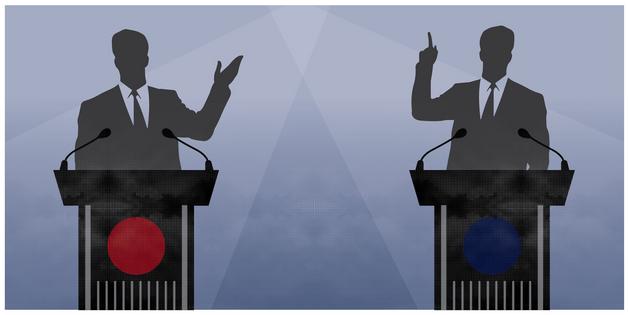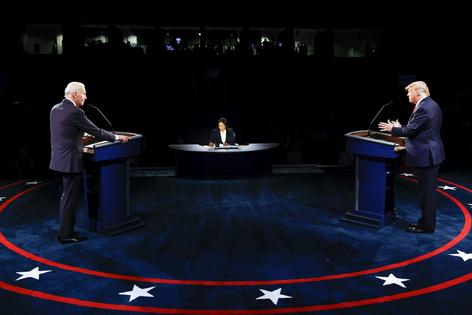Debate offers opportunity for errors, partisan spin − and maybe an opening for change
Published in Political News
The two leading presidential candidates are set to debate on live television on June 27, 2024. Neither will yet be the official nominee of his party, which is expected to happen at the parties’ conventions in the coming weeks.
The timing of the debate – on the Thursday leading into the week of the Fourth of July, far earlier than the usual fall debates – virtually guarantees a much smaller audience than would usually watch a presidential debate.
The event itself will be unlike most previous debates between presidential candidates, though it will be broadcast live on several TV channels and online, as is the norm.
It is sponsored and hosted by CNN, not by the nonpartisan Commission on Presidential Debates, which has sponsored every presidential debate since 1988. The debate rules say there will be no audience – the candidates will be in a television studio with just the moderators and production personnel. During the two commercial breaks, the candidates will not be allowed to interact with their campaign staff. CNN will mute the microphone of each candidate when it is not his turn to speak.
As a former political communications consultant who now teaches political communication at Auburn University, I believe there are key ways this new type of debate, at a different place and time than usual, could affect the presidential election.
Historically, debates tend to have greater effects on the outcome of elections when one of the candidates says or does something stupid.
For instance, in 1976 GOP candidate and then-President Gerald Ford insisted, wrongly, that Poland wasn’t under Communist rule. In 1988, Democratic candidate Michael Dukakis answered a question about his wife’s safety with a dispassionate speech on drug policy. In 1992, President George H.W. Bush repeatedly looked at his watch while debating Bill Clinton.
All three men lost their races for the White House.
Both candidates in the June 27 debate have weaknesses that could lead to similar problems – or worse.
If Biden appears lost or confused at any point in the debate, it could raise questions about his competence and seriously hurt his chances for reelection. If Trump launches into one of his tirades about any number of subjects, he could frighten moderates into voting for Biden or not voting at all.
Because neither political party has held its nominating conventions, it is not out of the question that a very poor showing by either candidate could lead to serious discussions about replacing that candidate as the party’s nominee.
The rules for the debate create some challenges and opportunities for each candidate.
The fact that microphones will be muted for the candidate who isn’t being asked a question should make it easier for Biden to stay focused and on message without being constantly interrupted by Trump, as he was when they debated in 2020. It should also make it easier for Trump to appear more like a statesman and less like a bully, since television audiences will be less likely to hear any interruptions or outbursts.
CNN’s moderators face the challenge of managing the speaking times and microphones in a way that does not appear to favor one candidate over the other.
Ideally, with no live audience to react to the candidates, viewers’ attention should be more easily focused on the substance of the candidates’ words.
Whether that happens will depend on the moderators. Jake Tapper and Dana Bash need to be careful not to appear to interrupt or challenge one candidate more than another. Many conservatives are already suspicious that CNN will show favor to Biden by asking him fewer follow-up questions or doing more on-the-spot fact-checking of Trump’s responses.
With fewer viewers in real time, there will be more opportunities for partisans to put their post-debate spin on what happened, both in traditional media and online.
Spin doctors are not new to presidential debates, but with fewer people having seen the full event in context, there will be more opportunity for selectively editing clips by the right to make Biden appear dazed and confused or by the left to show Trump as a bigot and a bully.
Even if the intent of a debate is for the candidates’ words to matter most, what carries a debate in the public’s eye is not the wise policy discussion or the nuanced diplomacy: It’s the sound bite.
Examples include Ronald Reagan’s quip about not making an issue of Walter Mondale’s youth and inexperience in 1984 and Lloyd Bentsen’s “Senator, you’re no Jack Kennedy” reply to Dan Quayle’s 1988 assertion that he had as much experience in the Senate as John F. Kennedy had before becoming president.
The single advantage of the June 27 debate is that it gives both campaigns the chance to test their candidates and messages while very few voters are paying attention. This could allow the campaigns to adjust their messages or – if things go terribly, horribly wrong – even letting the party choose another candidate.
This article is republished from The Conversation, a nonprofit, independent news organization bringing you facts and analysis to help you make sense of our complex world.
Read more:
Lessons on wrangling candidates from the masterful moderator of presidential debates, Jim Lehrer
Think presidential debates are dull? Thank 1950s TV game shows
Formerly worked as a political campaign consultant for Republican candidates and served as a member of the Alabama Republican Party Steering Committee. Both affiliations ended in 2016.
































































Comments